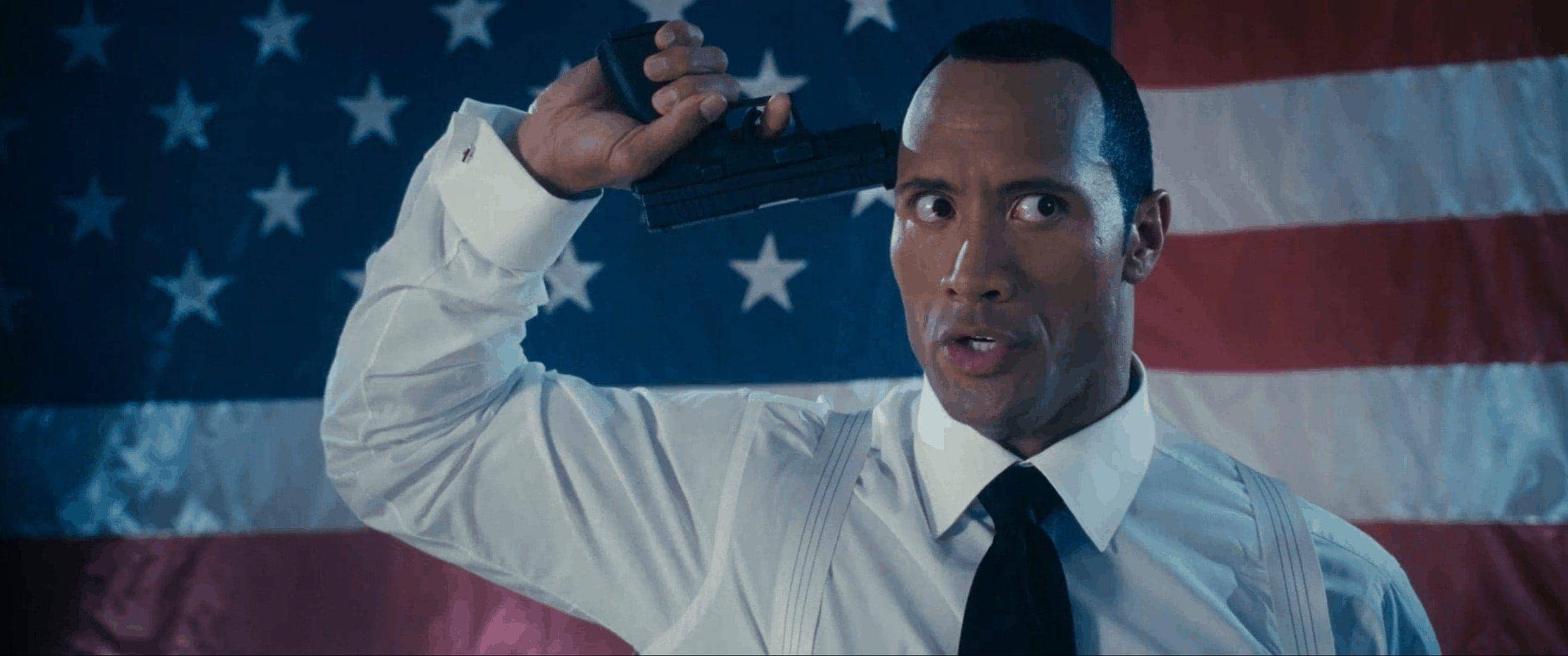

‘Fail again. Fail better.’ Samuel Beckett’s phrase has succeeded in standing the test of time – but perhaps because it flops as an aphorism. Is a better failure, for instance, closer to or further from success? It’s unclear. This ambiguity gets my thoughts rolling in a way that a cut-and-dry statement never could.
When I saw that MUBI are streaming Southland Tales, as part of their ‘Perfect Failures’ series, I wanted to write a piece on how the film is proof that it’s alright to fail. After all, it still haunts me all these years later with the possibility that I might have misinterpreted its many lapses and flaws, that it might in fact be a work of genius.
Is a better failure, for instance, closer to or further from success?
Directed by Richard Kelly, the follow up to Donnie Darko – very important for me as a teenager in the early noughties – this film was destined to blow my little, pubescent mind. It nearly did. Kelly’s film has a lot to tell us about failure, but, as with our Beckett quote, it’s not as simple as it might first appear.
Southland Tales is set in a near-future during a Third World War (an attempt to fictionalise then-president George Bush’s War on Terror) and includes a generator of inexhaustible energy ‘Fluid Karma’ ripping holes in the space-time continuum and an adult film star creating a Reality TV show and so on. Dwayne Johnson’s Boxer Santaros is an action star with amnesia who teams up with Sarah Michelle Gellar’s psychic ex-porn star Krysta Now. Together they write a prophetic screenplay, ‘The Power’, about the coming apocalypse.
ArrayPlenty of the film’s other plotlines sound like they might have been spat out of an online Plot Generator, too: Sean William Scott plays a cop who is part of a neo-Marxist scheme to overthrow the government, but he also plays the cop’s clone-twin brother, who gets kidnapped… or something. It’s almost as if Southland Tales courts a space on the sidelines, aspires to cult status from the get-go. The film’s desire to fail becomes, perversely, part of its wild ambition.
The film’s desire to fail becomes, perversely, part of its wild ambition.
While it’s difficult to decide whether the plot is over-ambitious or purposefully convoluted, what has become clear while I’ve been writing this is that all its various strands sound like soundbites. Thus, even as the plot is incoherent, it protects itself from being charged as such by the suggestion that it was never meant to make sense in its own context; that these plotlines would cohere elsewhere or with more information.
ArraySouthland Tales aspires to depth. (See Kelly’s tweets since the film’s streaming on MUBI pointing out things we might have missed, ‘all of the tattoos on Dwayne have meaning’, for instance.) Despite its actors’ performances seeming intentionally dialled up to 11, Southland Tales’ flattest scene might be its centrepiece.
Justin Timberlake lip-syncs The Killer’s ‘All These Things That I’ve Done’ in a doped-out hallucination; staring down the camera, in a blood-drenched T-shirt, sipping on a can of Budweiser, he makes his way through a pinball arcade. All the while, he’s flanked by an array of dancers in store-bought-looking Marilyn Monroe pouf wigs and stripogram nurse’s uniforms, pointing their legs in high Busby-Berkeley-esque camp.
ArrayFor all its unaccountable incoherence, Southland Tales has derived a remarkably unified public response. Consider Shane Danielsen’s description of watching it at its 2007 Cannes premiere: ‘more or less the entire audience was united in its contempt. As the film proceeded, there was the sound of jaws dropping, then titters of laughter — growing steadily louder as the audience contemplated the full panoply of horrors on display’. Through its almost universally acknowledged recognition as a failure, the film succeeds in producing a community orbiting around what it could have been.
Through its almost universally acknowledged recognition as a failure, the film succeeds in producing a community orbiting around what it could have been.
One thing is for sure: you can’t say Southland Tales is mediocre. Bad films, like great films, keep alive the possibility of what cinema can do. By examining Kelly’s magnum opus and its many failures, along with its failure to fail, and flirting with the giddy heights of the film it never quite becomes, I hope you can believe me now when I say: It’s alright to fail.




